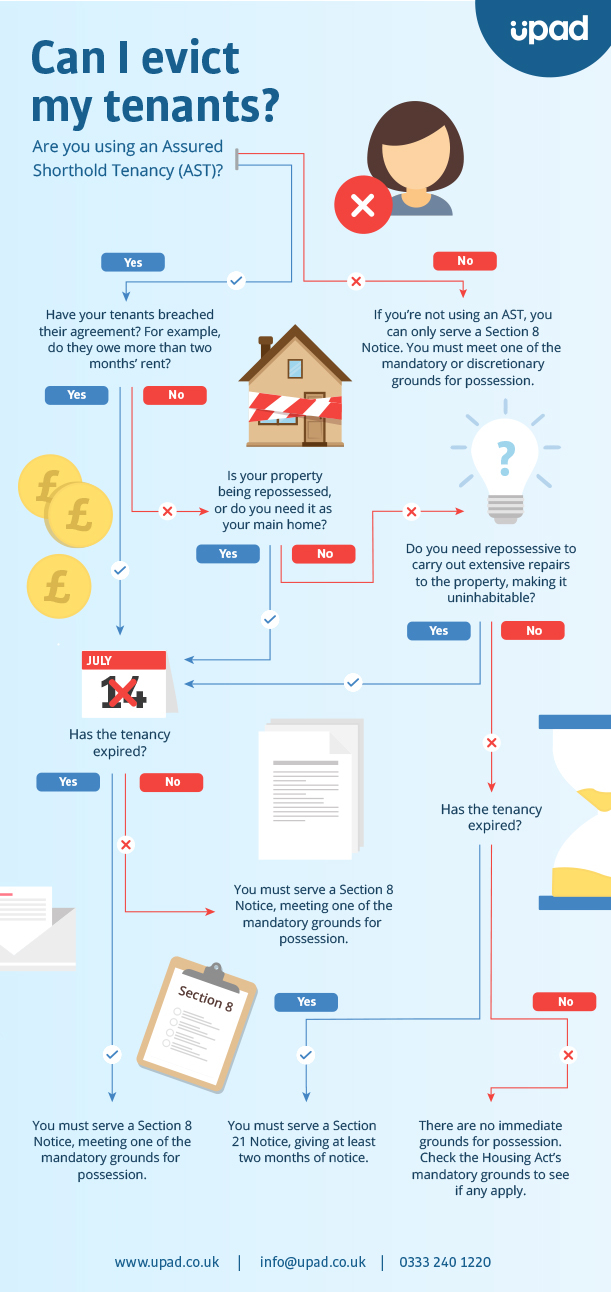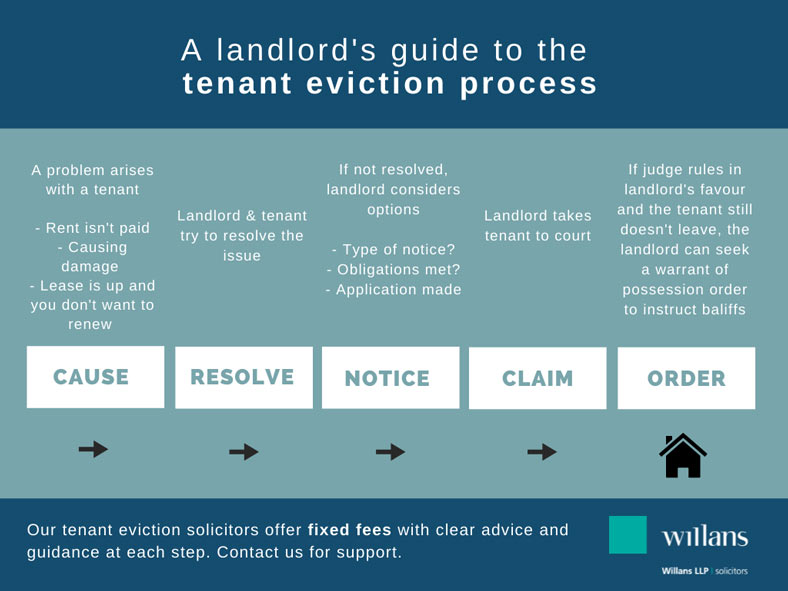Court Action to Evict a Tenant Is Known as
The tenant must give notice to the landlord for one of two reasons. Notice of a Possible Eviction.

Guide To Evicting A Tenant Alan Boswell Group
The Notice is a legal document that warns the tenant that unless they take a certain action like paying rent the landlord is.

. The process usually begins with a notice giving the tenant at least 5 days to fix the problem and may eventually end up in small claims court. A landlord can file an eviction action otherwise known as a forcible detainer action or special detainer action against a tenant for nonpayment of rent for breach of lease for misrepresenting information to the landlord for allowing unauthorized persons to live on the premises or if the tenant has committed a crime. Forcible Entry and Detainer FED commonly known as eviction is legally removing someone from a property like a house or an apartment because.
A landlord may only bring a non-payment action to remove a tenant after having notified the tenant that the rent has not been received. An eviction lawsuit is known as a forcible entry and detainer action in Maine. The court action used to evict a tenant who is in default is known as.
Or the tenant is not. Fill out the forms. If the tenant does not voluntarily move out at the end of the notice period the landlord must file a lawsuit known as an unlawful detainer action in order.
Landlords must file a lawsuit and get a court order to evict a tenant. Tenant Does Not Pay Rent. The court case that a landlord files to get a court order is called summary process the legal term for an eviction.
Below we will be going over a complete list of reasons that a tenant may be evicted. The removal of a tenant from a rented property by the landlord is known as eviction. A tenant can be evicted for a breach of their lease such as not paying rent significantly violating a term of a lease or for staying in a home.
In this first phase of an eviction the landlord gives the tenant an official Notice. Which of the following would be the most favorable lease for an owner of an improved business property located in a rapidly growing area. A Notice to Pay or Quit is used by a landlord to notify a tenant that he or she must pay any outstanding rent by a certain date or they must leave the property.
The landlord no longer wants to rent to the tenant. The Constitution prohibits taking someones property or evicting them from their home without a. Here is a list of eviction notices and what each is used for.
An eviction is a process landlords may begin when they believe a tenant has violated the lease and they want the tenant to fix the problem or leave the apartment. The court order that allows a landlord to evict a tenant is called an execution. You can read our blog on tacit relocation here.
If notice to quit has been served timeously the lease has come to an end and the tenant. This article will provide you with information about eviction also known as forcible entry and detainer which is a court action a landlord can use to remove a tenant from an apartment or house. Unlawful Detainer Actions in Court.
Eviction also known in North Carolina as summary ejectment is a legal action a landlord brings in court to remove a tenant from the landlords property. An Eviction Action is a claim filed by a landlord against a tenant for possession of a rental property. Civil Case Cover Sheet.
A tenant can be evicted for many reasons most of which are pretty self-explanatory. Or verbal - 3 day notice to pay or quit also known as a demand for rent. An eviction is the legal process in which a tenant is removed from a rental property.
These lawsuits are designed to resolve cases in which a tenant has breached a rental agreement. A Residential Eviction is a court action by a landlord against a tenant to remove evict the tenant from a rented dwelling house apartment mobile home mobile home space or floating home. The total amount that may be claimed in an Eviction Action filed in a Justice Court is 1000000 not including interest costs and awarded.
This can also be known as a repossession or an unlawful detainer. Removing a tenant without a court order is an illegal eviction or illegal lockout. If the tenant does not comply with the notice by paying rent andor moving out you have the option of going to Court and starting a LandlordTenant action eviction.
Landlords arent allowed to evict tenants without a court order and the sheriff is the only person authorized to evict tenants. Before you can be forced to move out the landlord - must commence a summary proceeding - meaning start the court process for eviction - to evict you legally from the apartment through a court process by filing a petition and notice of petition. This is known as tacit relocation.
A Notice to Quit is used by a landlord to evict a tenant. A Notice of Lease Violation is given to a tenant to notify them that they have breached the lease agreement. An unlawful detainer action.
A landlord seeking to evict a tenant from a rental unit covered by the Rent Ordinance must have a just cause for the eviction and must give a written notice to terminate the tenancy. Notices to the tenant in order to terminate the lease and evict the tenant for those the reasons listed. To avoid it the landlord should send a clear and explicit written notice to quit at least 40 clear days before the end date of the lease.
Even after a landlord gets an execution only a sheriff or constable can move a tenant and their belongings out of the property. To evict a tenant the landlord must have a valid reason for the eviction under Minnesota law and the landlord must properly complete all the steps for the eviction as required by Minnesota Statutes Chapter 504B and the. Use the Eviction Action Complainform HOU102 to ask the Court to evict a tenant from t residential or commercial rental property.
An eviction takes place when a person is legally required to vacate the property they are residing in. Raise an action for removing. What Is Eviction.
First a tenant will notify the landlord to end the lease when the landlord does not maintain the property as required by the lease or Florida Statutes. If you and the Tenant reach an agreement at any point during this process the agreement can be written up and the case dismissed. Non-Payment Proceeding An eviction action brought pursuant to RPAPL 711 2 by a landlord seeking to evict a tenant for having defaulted in payment of rent in violation of the agreement under which the tenant rents the premises.
The tenant is not paying rent.

Eviction By The Bailiff Shelter Cymru

Upad Advice For Evicting Tenants

Tenant Eviction Willans Solicitors Complete Guide For Landlords
No comments for "Court Action to Evict a Tenant Is Known as"
Post a Comment